Case Study: Director Duties and Breaches in Green Energy Ltd.
VerifiedAdded on 2022/10/06
|10
|2419
|42
Case Study
AI Summary
This assignment analyzes a business law case involving Green Energy Ltd. (GE), an Australian public listed company. The case examines the actions of GE's managing director, Dundee, who proposed an expansion into non-energy commodity trading despite negative market research findings. The analysis focuses on whether Dundee and other directors breached their duties under the Corporations Act, specifically sections 180, 181, 182, and 183, by failing to exercise due diligence, act in good faith, and properly disclose information. The case explores the potential remedies available to stakeholders, including Maya, who may have suffered losses due to the directors' actions. The analysis references relevant case law, such as Australian Securities and Investment Commission v Cassimatis and Winkworth v Edward Baron Development Ltd., to support its conclusions. The assignment ultimately concludes that Dundee breached his director duties, causing detriment to GE, and explores the implications of these breaches under the Corporations Act.
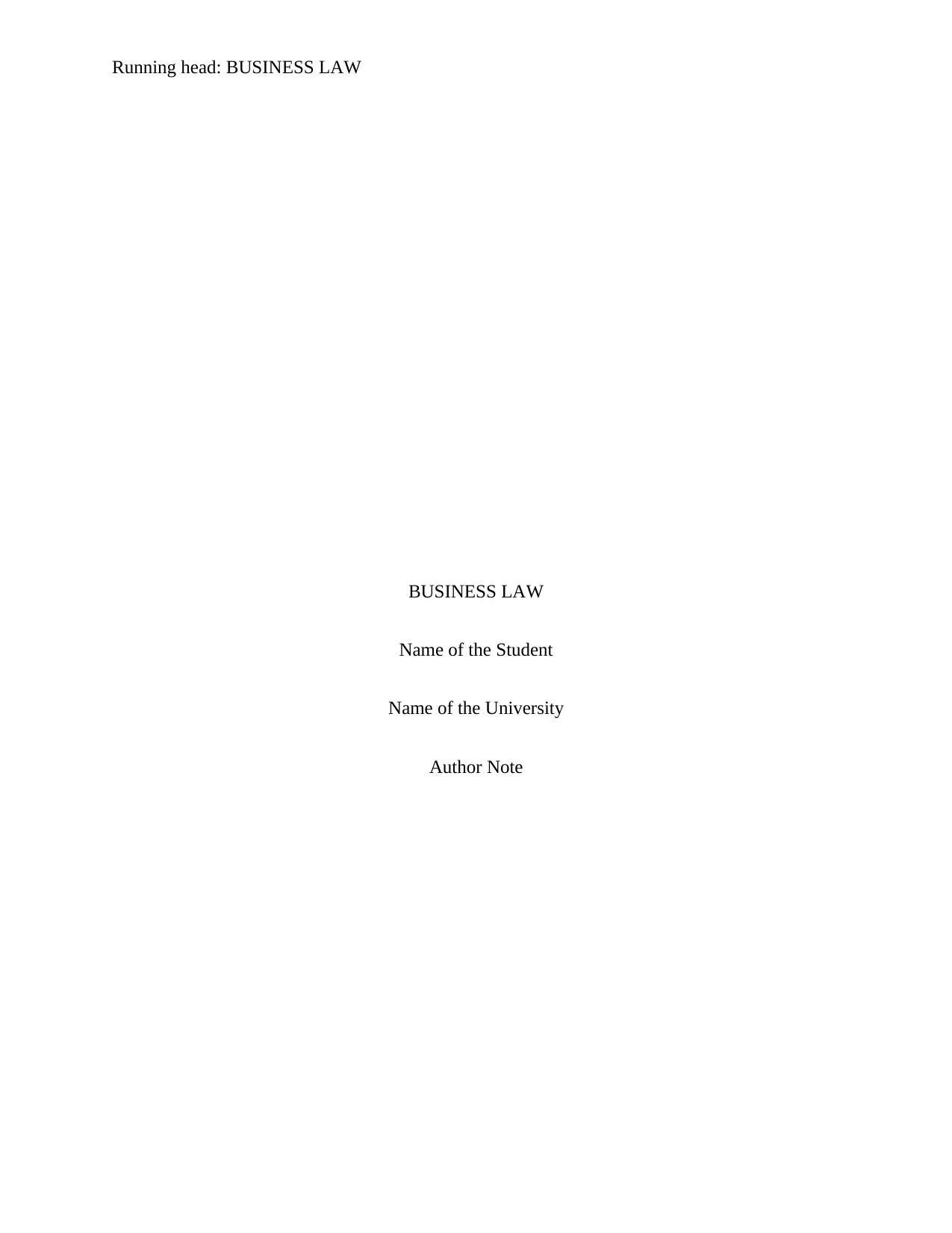
Running head: BUSINESS LAW
BUSINESS LAW
Name of the Student
Name of the University
Author Note
BUSINESS LAW
Name of the Student
Name of the University
Author Note
Paraphrase This Document
Need a fresh take? Get an instant paraphrase of this document with our AI Paraphraser
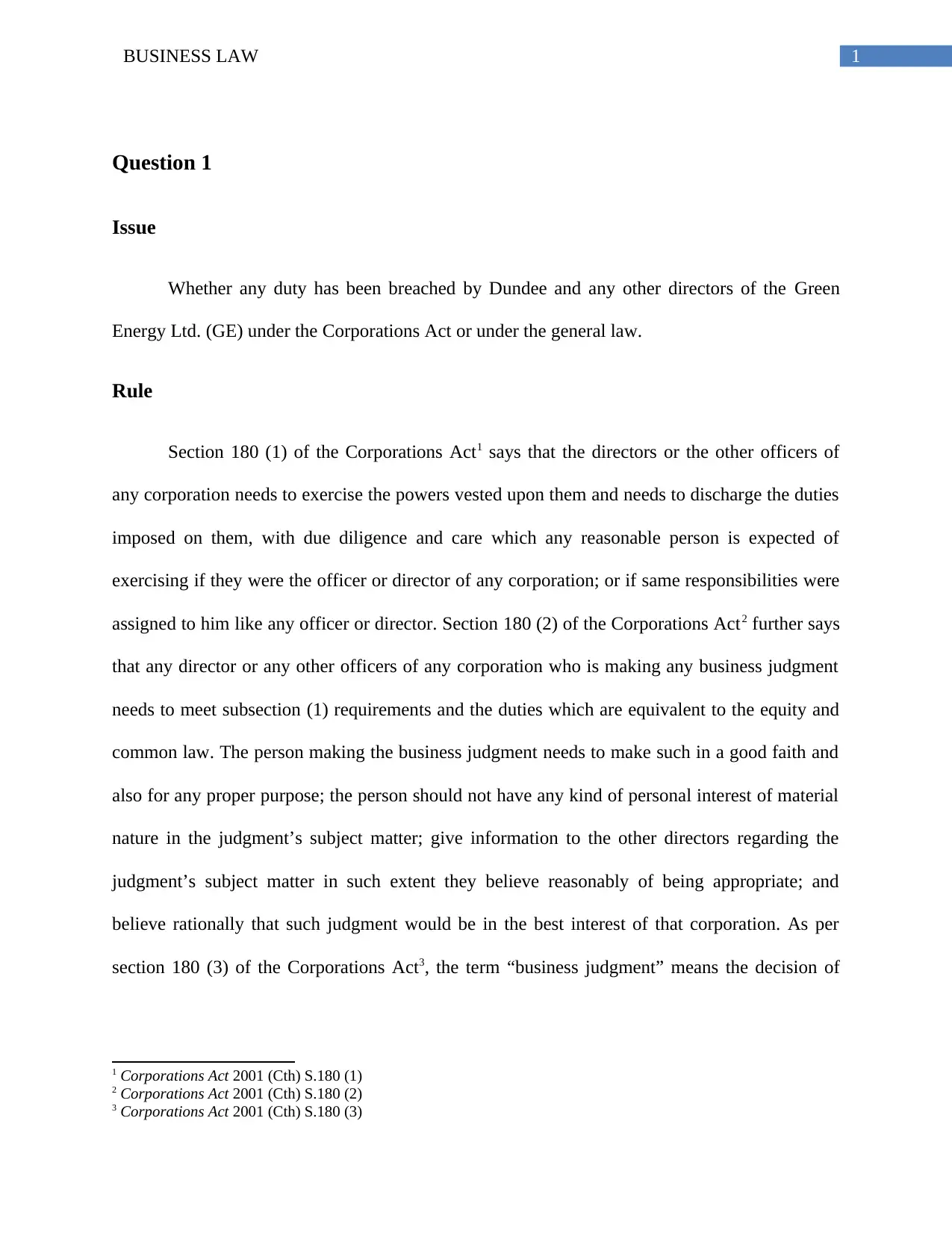
1BUSINESS LAW
Question 1
Issue
Whether any duty has been breached by Dundee and any other directors of the Green
Energy Ltd. (GE) under the Corporations Act or under the general law.
Rule
Section 180 (1) of the Corporations Act1 says that the directors or the other officers of
any corporation needs to exercise the powers vested upon them and needs to discharge the duties
imposed on them, with due diligence and care which any reasonable person is expected of
exercising if they were the officer or director of any corporation; or if same responsibilities were
assigned to him like any officer or director. Section 180 (2) of the Corporations Act2 further says
that any director or any other officers of any corporation who is making any business judgment
needs to meet subsection (1) requirements and the duties which are equivalent to the equity and
common law. The person making the business judgment needs to make such in a good faith and
also for any proper purpose; the person should not have any kind of personal interest of material
nature in the judgment’s subject matter; give information to the other directors regarding the
judgment’s subject matter in such extent they believe reasonably of being appropriate; and
believe rationally that such judgment would be in the best interest of that corporation. As per
section 180 (3) of the Corporations Act3, the term “business judgment” means the decision of
1 Corporations Act 2001 (Cth) S.180 (1)
2 Corporations Act 2001 (Cth) S.180 (2)
3 Corporations Act 2001 (Cth) S.180 (3)
Question 1
Issue
Whether any duty has been breached by Dundee and any other directors of the Green
Energy Ltd. (GE) under the Corporations Act or under the general law.
Rule
Section 180 (1) of the Corporations Act1 says that the directors or the other officers of
any corporation needs to exercise the powers vested upon them and needs to discharge the duties
imposed on them, with due diligence and care which any reasonable person is expected of
exercising if they were the officer or director of any corporation; or if same responsibilities were
assigned to him like any officer or director. Section 180 (2) of the Corporations Act2 further says
that any director or any other officers of any corporation who is making any business judgment
needs to meet subsection (1) requirements and the duties which are equivalent to the equity and
common law. The person making the business judgment needs to make such in a good faith and
also for any proper purpose; the person should not have any kind of personal interest of material
nature in the judgment’s subject matter; give information to the other directors regarding the
judgment’s subject matter in such extent they believe reasonably of being appropriate; and
believe rationally that such judgment would be in the best interest of that corporation. As per
section 180 (3) of the Corporations Act3, the term “business judgment” means the decision of
1 Corporations Act 2001 (Cth) S.180 (1)
2 Corporations Act 2001 (Cth) S.180 (2)
3 Corporations Act 2001 (Cth) S.180 (3)
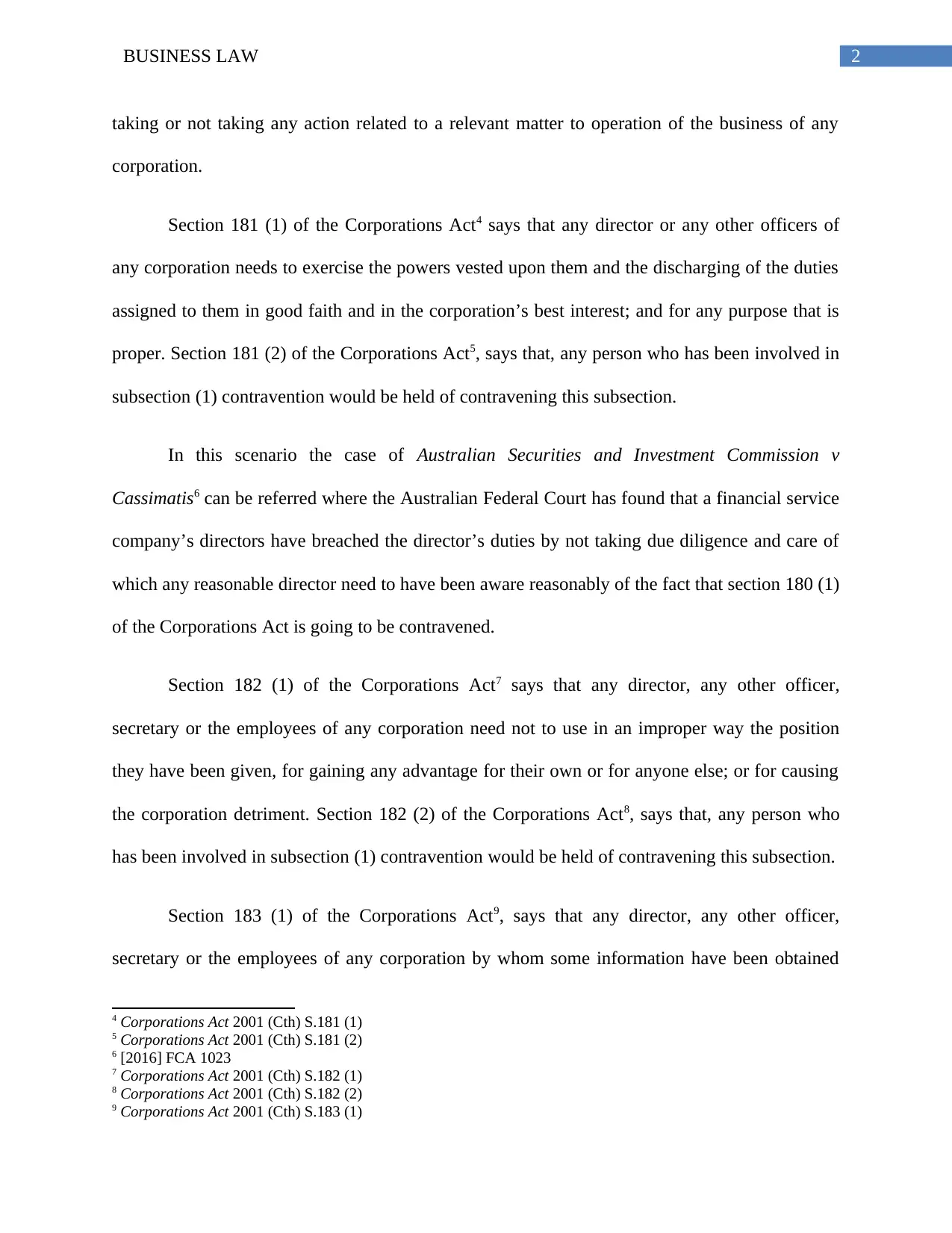
2BUSINESS LAW
taking or not taking any action related to a relevant matter to operation of the business of any
corporation.
Section 181 (1) of the Corporations Act4 says that any director or any other officers of
any corporation needs to exercise the powers vested upon them and the discharging of the duties
assigned to them in good faith and in the corporation’s best interest; and for any purpose that is
proper. Section 181 (2) of the Corporations Act5, says that, any person who has been involved in
subsection (1) contravention would be held of contravening this subsection.
In this scenario the case of Australian Securities and Investment Commission v
Cassimatis6 can be referred where the Australian Federal Court has found that a financial service
company’s directors have breached the director’s duties by not taking due diligence and care of
which any reasonable director need to have been aware reasonably of the fact that section 180 (1)
of the Corporations Act is going to be contravened.
Section 182 (1) of the Corporations Act7 says that any director, any other officer,
secretary or the employees of any corporation need not to use in an improper way the position
they have been given, for gaining any advantage for their own or for anyone else; or for causing
the corporation detriment. Section 182 (2) of the Corporations Act8, says that, any person who
has been involved in subsection (1) contravention would be held of contravening this subsection.
Section 183 (1) of the Corporations Act9, says that any director, any other officer,
secretary or the employees of any corporation by whom some information have been obtained
4 Corporations Act 2001 (Cth) S.181 (1)
5 Corporations Act 2001 (Cth) S.181 (2)
6 [2016] FCA 1023
7 Corporations Act 2001 (Cth) S.182 (1)
8 Corporations Act 2001 (Cth) S.182 (2)
9 Corporations Act 2001 (Cth) S.183 (1)
taking or not taking any action related to a relevant matter to operation of the business of any
corporation.
Section 181 (1) of the Corporations Act4 says that any director or any other officers of
any corporation needs to exercise the powers vested upon them and the discharging of the duties
assigned to them in good faith and in the corporation’s best interest; and for any purpose that is
proper. Section 181 (2) of the Corporations Act5, says that, any person who has been involved in
subsection (1) contravention would be held of contravening this subsection.
In this scenario the case of Australian Securities and Investment Commission v
Cassimatis6 can be referred where the Australian Federal Court has found that a financial service
company’s directors have breached the director’s duties by not taking due diligence and care of
which any reasonable director need to have been aware reasonably of the fact that section 180 (1)
of the Corporations Act is going to be contravened.
Section 182 (1) of the Corporations Act7 says that any director, any other officer,
secretary or the employees of any corporation need not to use in an improper way the position
they have been given, for gaining any advantage for their own or for anyone else; or for causing
the corporation detriment. Section 182 (2) of the Corporations Act8, says that, any person who
has been involved in subsection (1) contravention would be held of contravening this subsection.
Section 183 (1) of the Corporations Act9, says that any director, any other officer,
secretary or the employees of any corporation by whom some information have been obtained
4 Corporations Act 2001 (Cth) S.181 (1)
5 Corporations Act 2001 (Cth) S.181 (2)
6 [2016] FCA 1023
7 Corporations Act 2001 (Cth) S.182 (1)
8 Corporations Act 2001 (Cth) S.182 (2)
9 Corporations Act 2001 (Cth) S.183 (1)
⊘ This is a preview!⊘
Do you want full access?
Subscribe today to unlock all pages.

Trusted by 1+ million students worldwide
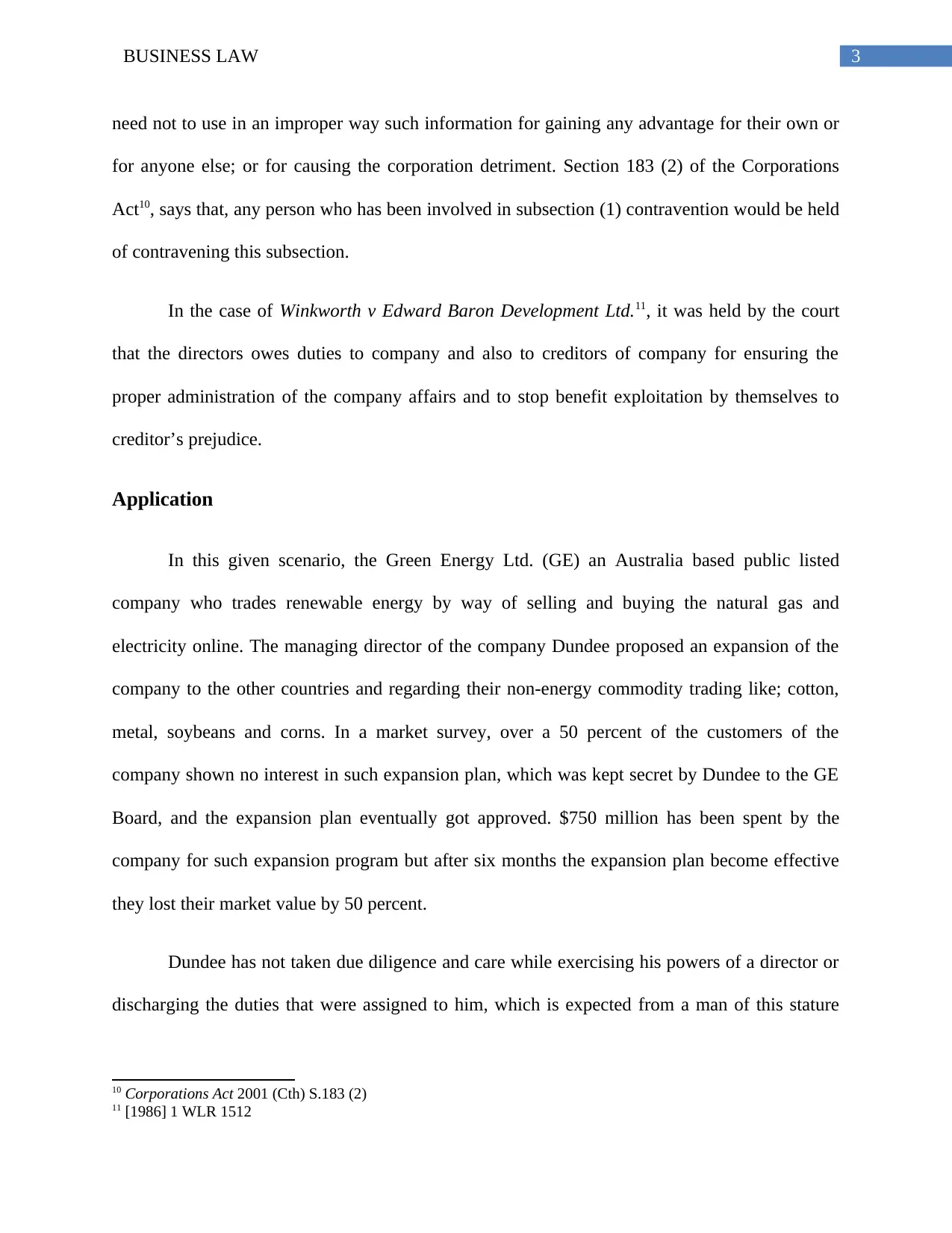
3BUSINESS LAW
need not to use in an improper way such information for gaining any advantage for their own or
for anyone else; or for causing the corporation detriment. Section 183 (2) of the Corporations
Act10, says that, any person who has been involved in subsection (1) contravention would be held
of contravening this subsection.
In the case of Winkworth v Edward Baron Development Ltd.11, it was held by the court
that the directors owes duties to company and also to creditors of company for ensuring the
proper administration of the company affairs and to stop benefit exploitation by themselves to
creditor’s prejudice.
Application
In this given scenario, the Green Energy Ltd. (GE) an Australia based public listed
company who trades renewable energy by way of selling and buying the natural gas and
electricity online. The managing director of the company Dundee proposed an expansion of the
company to the other countries and regarding their non-energy commodity trading like; cotton,
metal, soybeans and corns. In a market survey, over a 50 percent of the customers of the
company shown no interest in such expansion plan, which was kept secret by Dundee to the GE
Board, and the expansion plan eventually got approved. $750 million has been spent by the
company for such expansion program but after six months the expansion plan become effective
they lost their market value by 50 percent.
Dundee has not taken due diligence and care while exercising his powers of a director or
discharging the duties that were assigned to him, which is expected from a man of this stature
10 Corporations Act 2001 (Cth) S.183 (2)
11 [1986] 1 WLR 1512
need not to use in an improper way such information for gaining any advantage for their own or
for anyone else; or for causing the corporation detriment. Section 183 (2) of the Corporations
Act10, says that, any person who has been involved in subsection (1) contravention would be held
of contravening this subsection.
In the case of Winkworth v Edward Baron Development Ltd.11, it was held by the court
that the directors owes duties to company and also to creditors of company for ensuring the
proper administration of the company affairs and to stop benefit exploitation by themselves to
creditor’s prejudice.
Application
In this given scenario, the Green Energy Ltd. (GE) an Australia based public listed
company who trades renewable energy by way of selling and buying the natural gas and
electricity online. The managing director of the company Dundee proposed an expansion of the
company to the other countries and regarding their non-energy commodity trading like; cotton,
metal, soybeans and corns. In a market survey, over a 50 percent of the customers of the
company shown no interest in such expansion plan, which was kept secret by Dundee to the GE
Board, and the expansion plan eventually got approved. $750 million has been spent by the
company for such expansion program but after six months the expansion plan become effective
they lost their market value by 50 percent.
Dundee has not taken due diligence and care while exercising his powers of a director or
discharging the duties that were assigned to him, which is expected from a man of this stature
10 Corporations Act 2001 (Cth) S.183 (2)
11 [1986] 1 WLR 1512
Paraphrase This Document
Need a fresh take? Get an instant paraphrase of this document with our AI Paraphraser
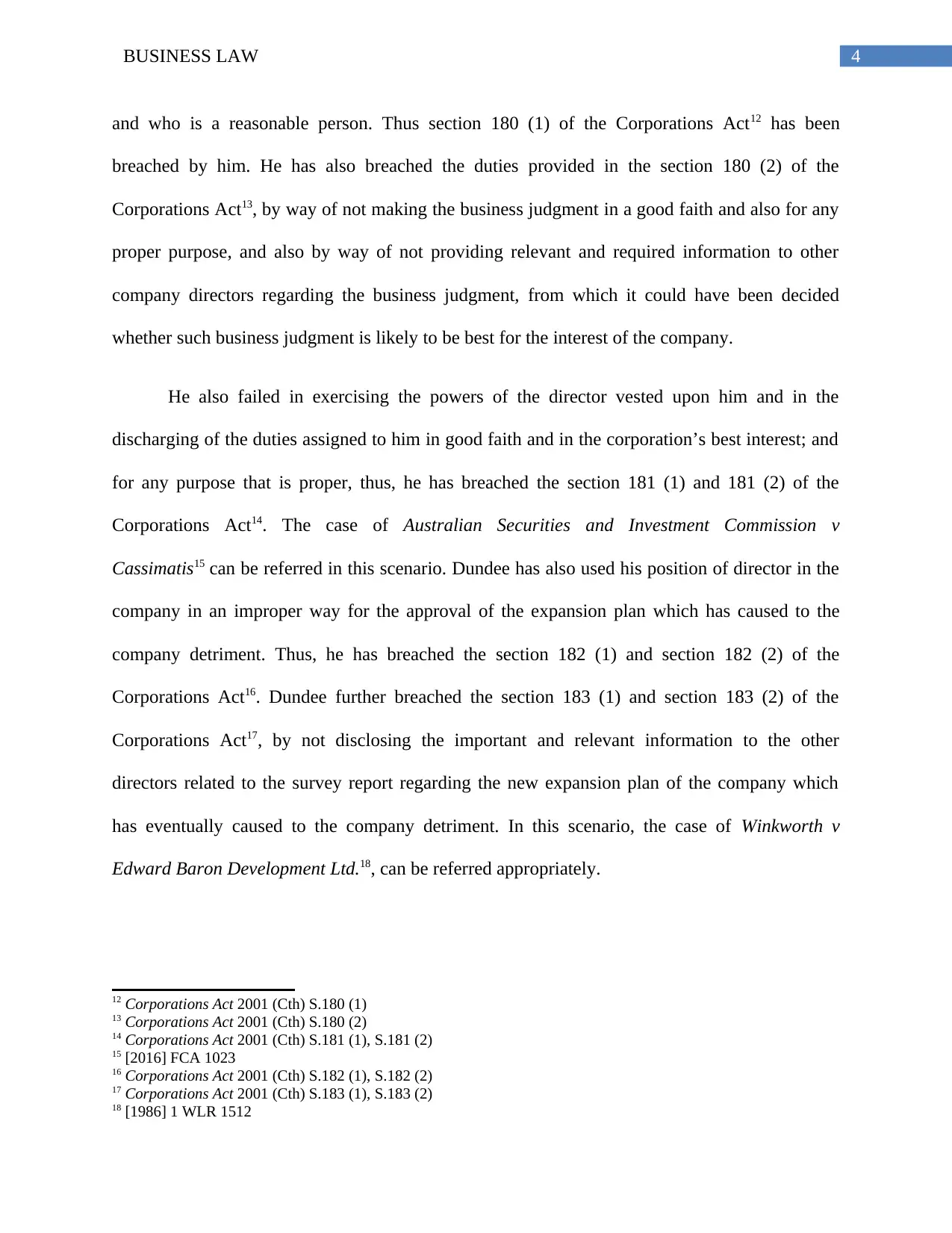
4BUSINESS LAW
and who is a reasonable person. Thus section 180 (1) of the Corporations Act12 has been
breached by him. He has also breached the duties provided in the section 180 (2) of the
Corporations Act13, by way of not making the business judgment in a good faith and also for any
proper purpose, and also by way of not providing relevant and required information to other
company directors regarding the business judgment, from which it could have been decided
whether such business judgment is likely to be best for the interest of the company.
He also failed in exercising the powers of the director vested upon him and in the
discharging of the duties assigned to him in good faith and in the corporation’s best interest; and
for any purpose that is proper, thus, he has breached the section 181 (1) and 181 (2) of the
Corporations Act14. The case of Australian Securities and Investment Commission v
Cassimatis15 can be referred in this scenario. Dundee has also used his position of director in the
company in an improper way for the approval of the expansion plan which has caused to the
company detriment. Thus, he has breached the section 182 (1) and section 182 (2) of the
Corporations Act16. Dundee further breached the section 183 (1) and section 183 (2) of the
Corporations Act17, by not disclosing the important and relevant information to the other
directors related to the survey report regarding the new expansion plan of the company which
has eventually caused to the company detriment. In this scenario, the case of Winkworth v
Edward Baron Development Ltd.18, can be referred appropriately.
12 Corporations Act 2001 (Cth) S.180 (1)
13 Corporations Act 2001 (Cth) S.180 (2)
14 Corporations Act 2001 (Cth) S.181 (1), S.181 (2)
15 [2016] FCA 1023
16 Corporations Act 2001 (Cth) S.182 (1), S.182 (2)
17 Corporations Act 2001 (Cth) S.183 (1), S.183 (2)
18 [1986] 1 WLR 1512
and who is a reasonable person. Thus section 180 (1) of the Corporations Act12 has been
breached by him. He has also breached the duties provided in the section 180 (2) of the
Corporations Act13, by way of not making the business judgment in a good faith and also for any
proper purpose, and also by way of not providing relevant and required information to other
company directors regarding the business judgment, from which it could have been decided
whether such business judgment is likely to be best for the interest of the company.
He also failed in exercising the powers of the director vested upon him and in the
discharging of the duties assigned to him in good faith and in the corporation’s best interest; and
for any purpose that is proper, thus, he has breached the section 181 (1) and 181 (2) of the
Corporations Act14. The case of Australian Securities and Investment Commission v
Cassimatis15 can be referred in this scenario. Dundee has also used his position of director in the
company in an improper way for the approval of the expansion plan which has caused to the
company detriment. Thus, he has breached the section 182 (1) and section 182 (2) of the
Corporations Act16. Dundee further breached the section 183 (1) and section 183 (2) of the
Corporations Act17, by not disclosing the important and relevant information to the other
directors related to the survey report regarding the new expansion plan of the company which
has eventually caused to the company detriment. In this scenario, the case of Winkworth v
Edward Baron Development Ltd.18, can be referred appropriately.
12 Corporations Act 2001 (Cth) S.180 (1)
13 Corporations Act 2001 (Cth) S.180 (2)
14 Corporations Act 2001 (Cth) S.181 (1), S.181 (2)
15 [2016] FCA 1023
16 Corporations Act 2001 (Cth) S.182 (1), S.182 (2)
17 Corporations Act 2001 (Cth) S.183 (1), S.183 (2)
18 [1986] 1 WLR 1512
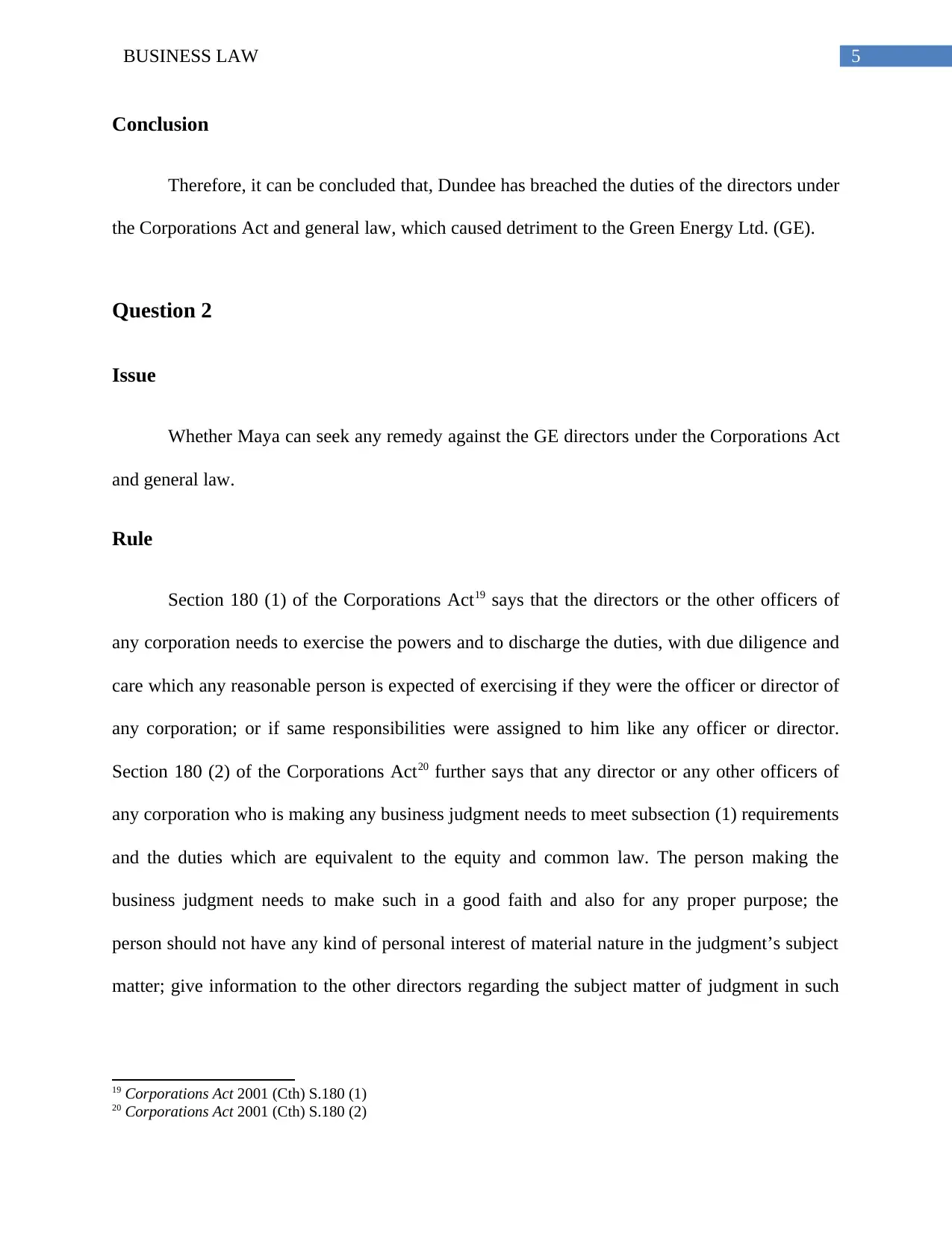
5BUSINESS LAW
Conclusion
Therefore, it can be concluded that, Dundee has breached the duties of the directors under
the Corporations Act and general law, which caused detriment to the Green Energy Ltd. (GE).
Question 2
Issue
Whether Maya can seek any remedy against the GE directors under the Corporations Act
and general law.
Rule
Section 180 (1) of the Corporations Act19 says that the directors or the other officers of
any corporation needs to exercise the powers and to discharge the duties, with due diligence and
care which any reasonable person is expected of exercising if they were the officer or director of
any corporation; or if same responsibilities were assigned to him like any officer or director.
Section 180 (2) of the Corporations Act20 further says that any director or any other officers of
any corporation who is making any business judgment needs to meet subsection (1) requirements
and the duties which are equivalent to the equity and common law. The person making the
business judgment needs to make such in a good faith and also for any proper purpose; the
person should not have any kind of personal interest of material nature in the judgment’s subject
matter; give information to the other directors regarding the subject matter of judgment in such
19 Corporations Act 2001 (Cth) S.180 (1)
20 Corporations Act 2001 (Cth) S.180 (2)
Conclusion
Therefore, it can be concluded that, Dundee has breached the duties of the directors under
the Corporations Act and general law, which caused detriment to the Green Energy Ltd. (GE).
Question 2
Issue
Whether Maya can seek any remedy against the GE directors under the Corporations Act
and general law.
Rule
Section 180 (1) of the Corporations Act19 says that the directors or the other officers of
any corporation needs to exercise the powers and to discharge the duties, with due diligence and
care which any reasonable person is expected of exercising if they were the officer or director of
any corporation; or if same responsibilities were assigned to him like any officer or director.
Section 180 (2) of the Corporations Act20 further says that any director or any other officers of
any corporation who is making any business judgment needs to meet subsection (1) requirements
and the duties which are equivalent to the equity and common law. The person making the
business judgment needs to make such in a good faith and also for any proper purpose; the
person should not have any kind of personal interest of material nature in the judgment’s subject
matter; give information to the other directors regarding the subject matter of judgment in such
19 Corporations Act 2001 (Cth) S.180 (1)
20 Corporations Act 2001 (Cth) S.180 (2)
⊘ This is a preview!⊘
Do you want full access?
Subscribe today to unlock all pages.

Trusted by 1+ million students worldwide
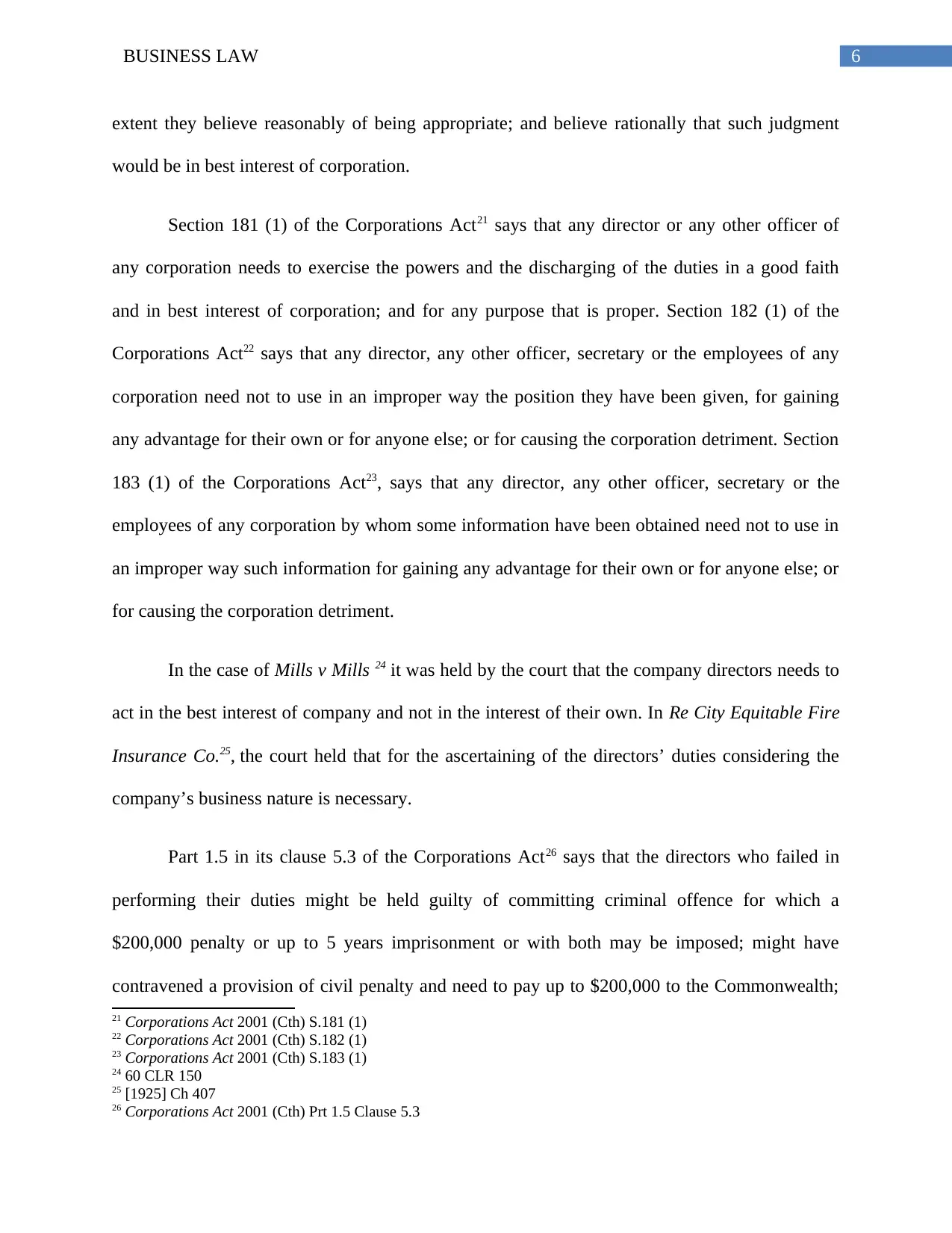
6BUSINESS LAW
extent they believe reasonably of being appropriate; and believe rationally that such judgment
would be in best interest of corporation.
Section 181 (1) of the Corporations Act21 says that any director or any other officer of
any corporation needs to exercise the powers and the discharging of the duties in a good faith
and in best interest of corporation; and for any purpose that is proper. Section 182 (1) of the
Corporations Act22 says that any director, any other officer, secretary or the employees of any
corporation need not to use in an improper way the position they have been given, for gaining
any advantage for their own or for anyone else; or for causing the corporation detriment. Section
183 (1) of the Corporations Act23, says that any director, any other officer, secretary or the
employees of any corporation by whom some information have been obtained need not to use in
an improper way such information for gaining any advantage for their own or for anyone else; or
for causing the corporation detriment.
In the case of Mills v Mills 24 it was held by the court that the company directors needs to
act in the best interest of company and not in the interest of their own. In Re City Equitable Fire
Insurance Co.25, the court held that for the ascertaining of the directors’ duties considering the
company’s business nature is necessary.
Part 1.5 in its clause 5.3 of the Corporations Act26 says that the directors who failed in
performing their duties might be held guilty of committing criminal offence for which a
$200,000 penalty or up to 5 years imprisonment or with both may be imposed; might have
contravened a provision of civil penalty and need to pay up to $200,000 to the Commonwealth;
21 Corporations Act 2001 (Cth) S.181 (1)
22 Corporations Act 2001 (Cth) S.182 (1)
23 Corporations Act 2001 (Cth) S.183 (1)
24 60 CLR 150
25 [1925] Ch 407
26 Corporations Act 2001 (Cth) Prt 1.5 Clause 5.3
extent they believe reasonably of being appropriate; and believe rationally that such judgment
would be in best interest of corporation.
Section 181 (1) of the Corporations Act21 says that any director or any other officer of
any corporation needs to exercise the powers and the discharging of the duties in a good faith
and in best interest of corporation; and for any purpose that is proper. Section 182 (1) of the
Corporations Act22 says that any director, any other officer, secretary or the employees of any
corporation need not to use in an improper way the position they have been given, for gaining
any advantage for their own or for anyone else; or for causing the corporation detriment. Section
183 (1) of the Corporations Act23, says that any director, any other officer, secretary or the
employees of any corporation by whom some information have been obtained need not to use in
an improper way such information for gaining any advantage for their own or for anyone else; or
for causing the corporation detriment.
In the case of Mills v Mills 24 it was held by the court that the company directors needs to
act in the best interest of company and not in the interest of their own. In Re City Equitable Fire
Insurance Co.25, the court held that for the ascertaining of the directors’ duties considering the
company’s business nature is necessary.
Part 1.5 in its clause 5.3 of the Corporations Act26 says that the directors who failed in
performing their duties might be held guilty of committing criminal offence for which a
$200,000 penalty or up to 5 years imprisonment or with both may be imposed; might have
contravened a provision of civil penalty and need to pay up to $200,000 to the Commonwealth;
21 Corporations Act 2001 (Cth) S.181 (1)
22 Corporations Act 2001 (Cth) S.182 (1)
23 Corporations Act 2001 (Cth) S.183 (1)
24 60 CLR 150
25 [1925] Ch 407
26 Corporations Act 2001 (Cth) Prt 1.5 Clause 5.3
Paraphrase This Document
Need a fresh take? Get an instant paraphrase of this document with our AI Paraphraser
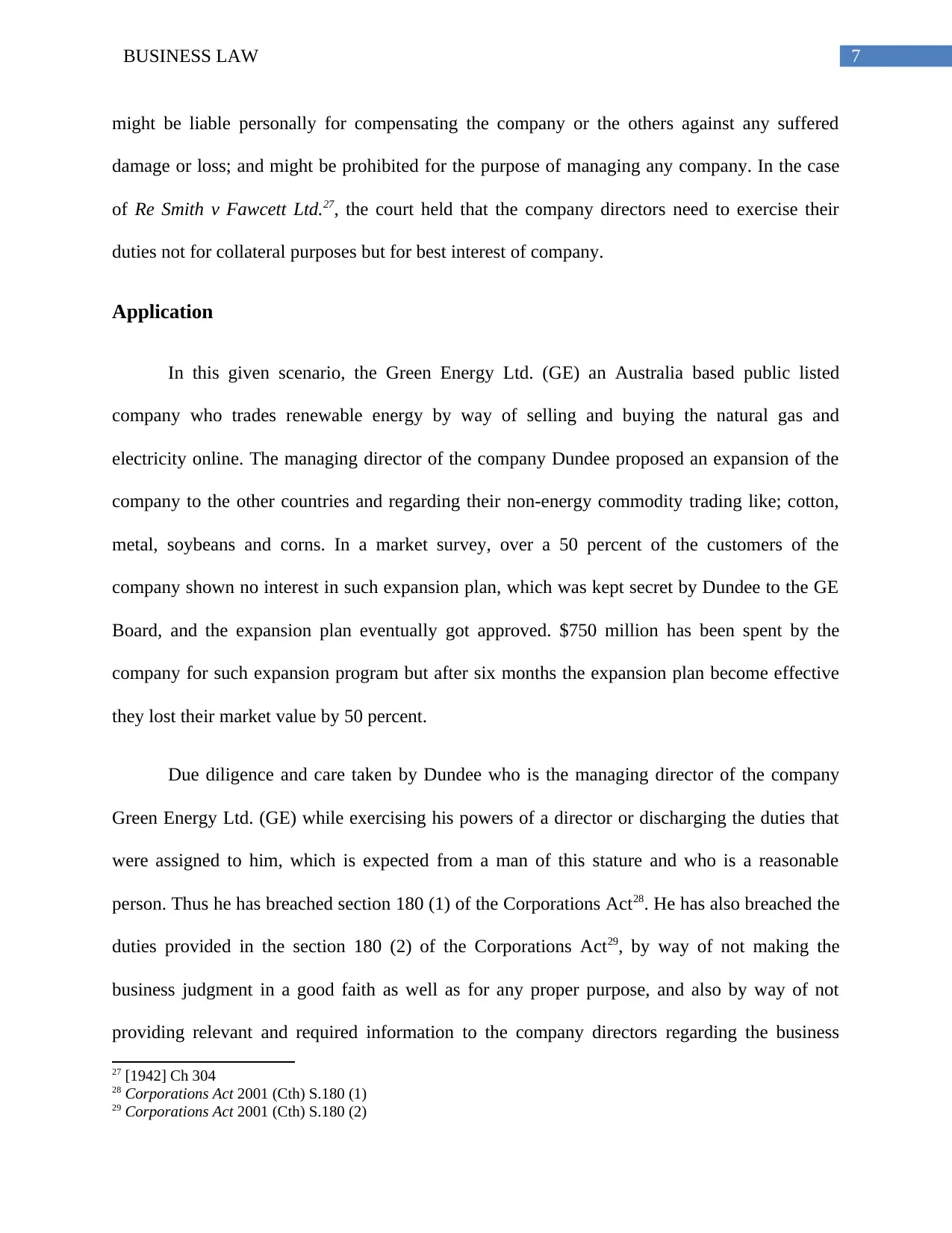
7BUSINESS LAW
might be liable personally for compensating the company or the others against any suffered
damage or loss; and might be prohibited for the purpose of managing any company. In the case
of Re Smith v Fawcett Ltd.27, the court held that the company directors need to exercise their
duties not for collateral purposes but for best interest of company.
Application
In this given scenario, the Green Energy Ltd. (GE) an Australia based public listed
company who trades renewable energy by way of selling and buying the natural gas and
electricity online. The managing director of the company Dundee proposed an expansion of the
company to the other countries and regarding their non-energy commodity trading like; cotton,
metal, soybeans and corns. In a market survey, over a 50 percent of the customers of the
company shown no interest in such expansion plan, which was kept secret by Dundee to the GE
Board, and the expansion plan eventually got approved. $750 million has been spent by the
company for such expansion program but after six months the expansion plan become effective
they lost their market value by 50 percent.
Due diligence and care taken by Dundee who is the managing director of the company
Green Energy Ltd. (GE) while exercising his powers of a director or discharging the duties that
were assigned to him, which is expected from a man of this stature and who is a reasonable
person. Thus he has breached section 180 (1) of the Corporations Act28. He has also breached the
duties provided in the section 180 (2) of the Corporations Act29, by way of not making the
business judgment in a good faith as well as for any proper purpose, and also by way of not
providing relevant and required information to the company directors regarding the business
27 [1942] Ch 304
28 Corporations Act 2001 (Cth) S.180 (1)
29 Corporations Act 2001 (Cth) S.180 (2)
might be liable personally for compensating the company or the others against any suffered
damage or loss; and might be prohibited for the purpose of managing any company. In the case
of Re Smith v Fawcett Ltd.27, the court held that the company directors need to exercise their
duties not for collateral purposes but for best interest of company.
Application
In this given scenario, the Green Energy Ltd. (GE) an Australia based public listed
company who trades renewable energy by way of selling and buying the natural gas and
electricity online. The managing director of the company Dundee proposed an expansion of the
company to the other countries and regarding their non-energy commodity trading like; cotton,
metal, soybeans and corns. In a market survey, over a 50 percent of the customers of the
company shown no interest in such expansion plan, which was kept secret by Dundee to the GE
Board, and the expansion plan eventually got approved. $750 million has been spent by the
company for such expansion program but after six months the expansion plan become effective
they lost their market value by 50 percent.
Due diligence and care taken by Dundee who is the managing director of the company
Green Energy Ltd. (GE) while exercising his powers of a director or discharging the duties that
were assigned to him, which is expected from a man of this stature and who is a reasonable
person. Thus he has breached section 180 (1) of the Corporations Act28. He has also breached the
duties provided in the section 180 (2) of the Corporations Act29, by way of not making the
business judgment in a good faith as well as for any proper purpose, and also by way of not
providing relevant and required information to the company directors regarding the business
27 [1942] Ch 304
28 Corporations Act 2001 (Cth) S.180 (1)
29 Corporations Act 2001 (Cth) S.180 (2)
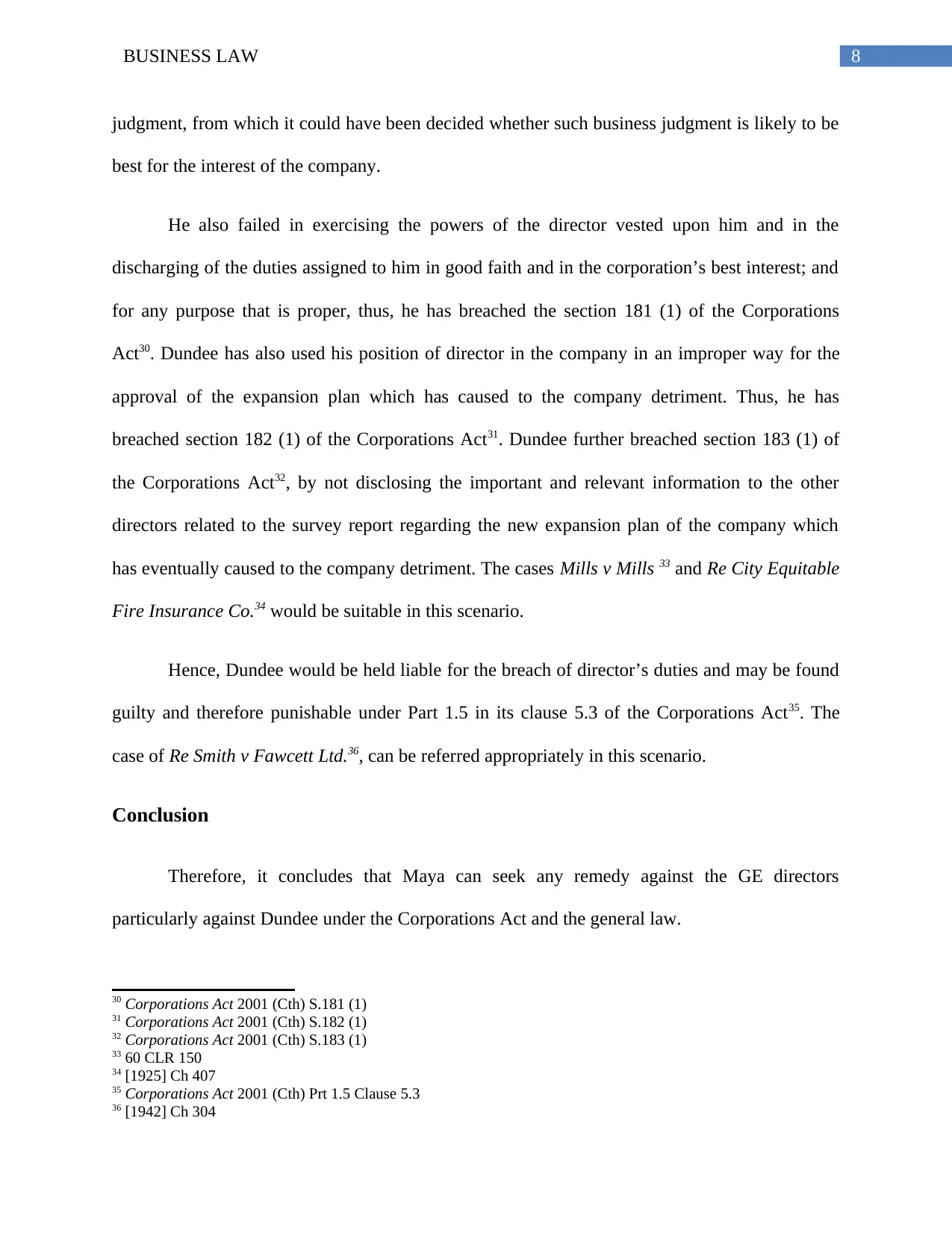
8BUSINESS LAW
judgment, from which it could have been decided whether such business judgment is likely to be
best for the interest of the company.
He also failed in exercising the powers of the director vested upon him and in the
discharging of the duties assigned to him in good faith and in the corporation’s best interest; and
for any purpose that is proper, thus, he has breached the section 181 (1) of the Corporations
Act30. Dundee has also used his position of director in the company in an improper way for the
approval of the expansion plan which has caused to the company detriment. Thus, he has
breached section 182 (1) of the Corporations Act31. Dundee further breached section 183 (1) of
the Corporations Act32, by not disclosing the important and relevant information to the other
directors related to the survey report regarding the new expansion plan of the company which
has eventually caused to the company detriment. The cases Mills v Mills 33 and Re City Equitable
Fire Insurance Co.34 would be suitable in this scenario.
Hence, Dundee would be held liable for the breach of director’s duties and may be found
guilty and therefore punishable under Part 1.5 in its clause 5.3 of the Corporations Act35. The
case of Re Smith v Fawcett Ltd.36, can be referred appropriately in this scenario.
Conclusion
Therefore, it concludes that Maya can seek any remedy against the GE directors
particularly against Dundee under the Corporations Act and the general law.
30 Corporations Act 2001 (Cth) S.181 (1)
31 Corporations Act 2001 (Cth) S.182 (1)
32 Corporations Act 2001 (Cth) S.183 (1)
33 60 CLR 150
34 [1925] Ch 407
35 Corporations Act 2001 (Cth) Prt 1.5 Clause 5.3
36 [1942] Ch 304
judgment, from which it could have been decided whether such business judgment is likely to be
best for the interest of the company.
He also failed in exercising the powers of the director vested upon him and in the
discharging of the duties assigned to him in good faith and in the corporation’s best interest; and
for any purpose that is proper, thus, he has breached the section 181 (1) of the Corporations
Act30. Dundee has also used his position of director in the company in an improper way for the
approval of the expansion plan which has caused to the company detriment. Thus, he has
breached section 182 (1) of the Corporations Act31. Dundee further breached section 183 (1) of
the Corporations Act32, by not disclosing the important and relevant information to the other
directors related to the survey report regarding the new expansion plan of the company which
has eventually caused to the company detriment. The cases Mills v Mills 33 and Re City Equitable
Fire Insurance Co.34 would be suitable in this scenario.
Hence, Dundee would be held liable for the breach of director’s duties and may be found
guilty and therefore punishable under Part 1.5 in its clause 5.3 of the Corporations Act35. The
case of Re Smith v Fawcett Ltd.36, can be referred appropriately in this scenario.
Conclusion
Therefore, it concludes that Maya can seek any remedy against the GE directors
particularly against Dundee under the Corporations Act and the general law.
30 Corporations Act 2001 (Cth) S.181 (1)
31 Corporations Act 2001 (Cth) S.182 (1)
32 Corporations Act 2001 (Cth) S.183 (1)
33 60 CLR 150
34 [1925] Ch 407
35 Corporations Act 2001 (Cth) Prt 1.5 Clause 5.3
36 [1942] Ch 304
⊘ This is a preview!⊘
Do you want full access?
Subscribe today to unlock all pages.

Trusted by 1+ million students worldwide
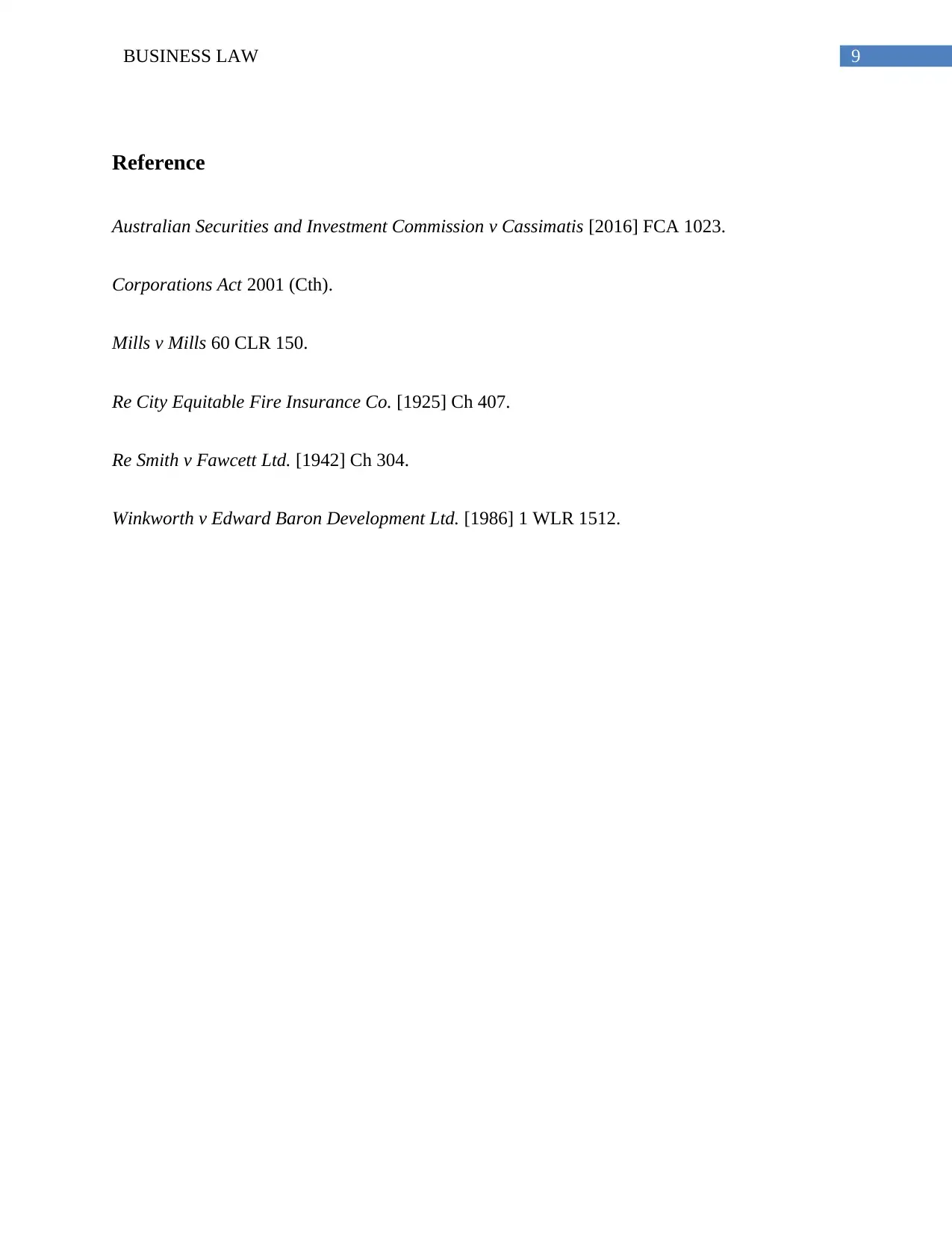
9BUSINESS LAW
Reference
Australian Securities and Investment Commission v Cassimatis [2016] FCA 1023.
Corporations Act 2001 (Cth).
Mills v Mills 60 CLR 150.
Re City Equitable Fire Insurance Co. [1925] Ch 407.
Re Smith v Fawcett Ltd. [1942] Ch 304.
Winkworth v Edward Baron Development Ltd. [1986] 1 WLR 1512.
Reference
Australian Securities and Investment Commission v Cassimatis [2016] FCA 1023.
Corporations Act 2001 (Cth).
Mills v Mills 60 CLR 150.
Re City Equitable Fire Insurance Co. [1925] Ch 407.
Re Smith v Fawcett Ltd. [1942] Ch 304.
Winkworth v Edward Baron Development Ltd. [1986] 1 WLR 1512.
1 out of 10
Related Documents
Your All-in-One AI-Powered Toolkit for Academic Success.
+13062052269
info@desklib.com
Available 24*7 on WhatsApp / Email
![[object Object]](/_next/static/media/star-bottom.7253800d.svg)
Unlock your academic potential
Copyright © 2020–2026 A2Z Services. All Rights Reserved. Developed and managed by ZUCOL.




